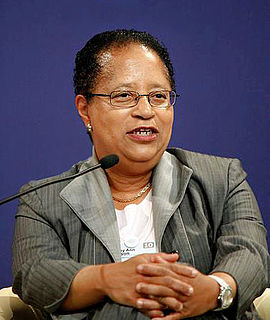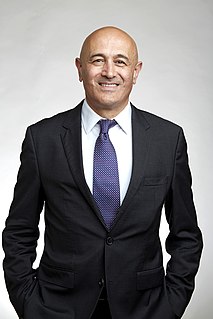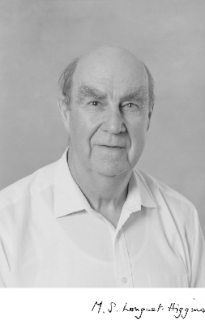Related Research Articles

Shirley Ann Jackson, is an American physicist, and the eighteenth president of Rensselaer Polytechnic Institute. She is the first African-American woman to have earned a doctorate at the Massachusetts Institute of Technology (MIT). She is also the second African-American woman in the United States to earn a doctorate in physics.

BCS, The Chartered Institute for IT, known as the British Computer Society until 2009, is a professional body and a learned society that represents those working in information technology (IT) and computer science, both in the United Kingdom and internationally. Founded in 1956, BCS has played an important role in educating and nurturing IT professionals, computer scientists, computer engineers, upholding the profession, accrediting chartered IT professional status, and creating a global community active in promoting and furthering the field and practice of computing.

Ebony-Jewel Cora-Lee Camellia Rosamond Rainford-Brent is an English former cricketer who is now a commentator and Director of Women's Cricket at Surrey. She was the first black woman to play for England. She was also captain of the Surrey women's team.
Dame Julia Stretton Higgins is a polymer scientist. Since 1976 she has been based at the Department of Chemical Engineering at Imperial College London, where she is Emeritus Professor and Senior Research Investigator.
The Australian Research Council (ARC) is the primary non-medical research funding agency of the Australian Government, distributing more than A$800 million in grants each year. The Council was established by the Australian Research Council Act 2001, and provides competitive research funding to academics and researchers at Australian universities. Most health and medical research in Australia is funded by the more specialised National Health and Medical Research Council (NHMRC), which operates under a separate budget.

Hugh Esmor Huxley MBE FRS was a British molecular biologist who made important discoveries in the physiology of muscle. He was a graduate in physics from Christ's College, Cambridge. However, his education was interrupted for five years by the Second World War, during which he served in the Royal Air Force. His contribution to development of radar earned him an MBE.

Margaret Elizabeth Philbin OBE is an English radio and television presenter whose credits include Tomorrow's World, Multi-Coloured Swap Shop and latterly Bang Goes the Theory.

Pauline Perry, Baroness Perry of Southwark is an educator, educationist, academic, and activist. She is a Conservative politician and was for 25 years a working member of the British House of Lords. In 1981 she became Her Majesty's Chief Inspector of Schools in England. In 1986 she became Vice-Chancellor of South Bank Polytechnic, and serving during its transition to a university, became the first woman in history to run a British university.

Jameel Sadik "Jim" Al-Khalili is an Iraqi-British theoretical physicist, author and broadcaster. He is professor of theoretical physics and chair in the public engagement in science at the University of Surrey. He is a regular broadcaster and presenter of science programmes on BBC radio and television, and a frequent commentator about science in other British media.
Marie Skłodowska-Curie Actions (MSCA) is a set of major research fellowships created by the European Union/European Commission to support research in the European Research Area (ERA). The Marie Skłodowska-Curie Actions are among Europe's most competitive and prestigious research and innovation fellowships.

Michael Selwyn Longuet-Higgins FRS was a mathematician and oceanographer at the Department of Applied Mathematics and Theoretical Physics (DAMTP), Cambridge University, England and Institute for Nonlinear Science, University of California, San Diego, USA. He was the younger brother of H. Christopher Longuet-Higgins.

The Women's Engineering Society is a United Kingdom professional learned society and networking body for women engineers, scientists and technologists. It was the first professional body set up for women working in all areas of engineering, predating the Society of Women Engineers by around 30 years.

Margaret Ebunoluwa Aderin-Pocock is a British space scientist and science educator. She is an honorary research associate of University College London's Department of Physics and Astronomy. Since February 2014, she has co-presented the long-running astronomy television programme The Sky at Night with Chris Lintott. In 2020 she was awarded the Institute of Physics William Thomson, Lord Kelvin Medal and Prize for her public engagement in physics. She is the first African woman to win a gold medal in the Physics News Award. She has also earned the title of the president-elect of the British Science Association
Sir Eric Keightley Rideal, was an English physical chemist. He worked on a wide range of subjects, including electrochemistry, chemical kinetics, catalysis, electrophoresis, colloids and surface chemistry. He is best known for the Eley–Rideal mechanism, which he proposed in 1938 with Daniel D. Eley. He is also known for the textbook that he authored, An Introduction to Surface Chemistry (1926), and was awarded honours for the research he carried out during both World Wars and for his services to chemistry.

Daphne Frances Jackson was a nuclear physicist. In 1971 she became the first female physics professor in the UK. A legacy after her death in 1991 enabled the foundation of the Daphne Jackson Trust.

Tara Georgina Shears is a Professor of Physics at the University of Liverpool.
Sandi Peterson is an American businesswoman. She is currently an Operating Partner at Clayton, Dubilier & Rice and serves on the Microsoft Board of Directors. She was group worldwide chairman at Johnson & Johnson from 2012-2018 and previously held leadership positions at Bayer Medical Care, Medco Health Solutions, Nabisco and Whirlpool Corporation.
Elizabeth Johnson was an American theoretical physicist, who was awarded an MBE in 2002 for "services to people returning to careers in science, engineering and technology". Johnson was influential in establishing the Daphne Jackson Trust and was one of the first women to receive a fellowship after a career break for family commitments.
Becky Parker is a British physicist and physics teacher based in Kent. She is a Visiting Professor at School of Physics and Astronomy, Queen Mary University of London.
Teresa Mary Anderson is a British physicist and the director of the University of Manchester's Discovery Centre at Jodrell Bank Observatory. She is a professor at the University of Manchester and the curator of science at the Bluedot Festival.
References
- 1 2 "The Daphne Jackson Memorial Fellowships Trust, registered charity no. 1125867". Charity Commission for England and Wales.
- 1 2 Perry, Katie (9 October 2003). "Obituary: Betty Johnson". The Guardian . Retrieved 8 March 2012.
The physicist Professor Elizabeth (Betty) Johnson, who has died aged 66, was a major force in the establishment of the Daphne Jackson Trust in 1992 to help women returning to science after a career break.
- ↑ "Online catalogue – The UKRC". The UKRC. 28 May 2010. Archived from the original on 20 January 2012. Retrieved 8 March 2012.
The Trust normally offers two-year part-time Fellowships, which are held at a UK University or research laboratory. Fellows carry out a supervised research project and retraining programme.
- ↑ "University of Surrey Press Release". 16 January 2002. Archived from the original on 26 May 2008. Retrieved 13 March 2012.
Daphne Jackson was Britain's first woman professor of physics and lived in Guildford until her untimely death in 1991.
- ↑ "Memorandum to the Parliamentary Select Committee on Innovation, Universities and Skills, Memorandum 50". 27 March 2008. Retrieved 14 March 2012.
Professor Daphne Jackson, who set up in 1985 the first (and still the only) retraining initiative to help women scientists return to research after a career break summarised the issue of women returners most succinctly by saying "Imagine a society that would allow Marie Curie to stack shelves in a supermarket simply because she took a career break for family reasons".
- ↑ Perry, Katie (9 October 2003). "Obituary: Betty Johnson". The Guardian . Retrieved 8 March 2012.
Jackson set up the Daphne Jackson Fellowship scheme in 1985, offering female returners to science a chance to retrain and update their skills over the course of two-year academic and industrial fellowships.
- ↑ "University of Surrey Press Release about Betty Johnson MBE". 19 June 2002. Archived from the original on 26 May 2008. Retrieved 13 March 2012.
Dr Betty Johnson, Co-ordinator of the Daphne Jackson Trust has been awarded the MBE in the Queen's Birthday Honours list for services to people returning to careers in Science, Engineering and Technology (SET).
- ↑ "Times Higher Education – Daphne Jackson Trust names its 100th fellow". Times Higher Education . 20 September 2002. Retrieved 8 March 2012.
The Daphne Jackson Trust has named its 100th fellow since it was set up ten years ago.
- ↑ Davis, Caroline (24 October 2003). "Times Higher Education – Men who juggle campus and Pampers". Times Higher Education . Retrieved 8 March 2012.
Kafala had begun to fear that his academic career was over, but he has just found a part-time research position in medical physics at Surrey University. He got a helping hand from an unexpected quarter, the Daphne Jackson Trust.
- ↑ Perry, Katie (6 February 2004). "Five Children and a Fellowship – Science Careers – Biotech, Pharmaceutical, Faculty, Postdoc jobs on Science Careers". Science . Retrieved 8 March 2012.
Kafala became the first male Daphne Jackson Fellow in September 2003.
[ permanent dead link ] - ↑ "The Daphne Jackson Memorial Fellowships Trust, registered charity no. 1009605". Charity Commission for England and Wales.